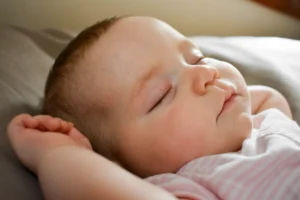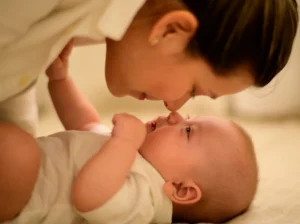It’s time to chat about a must-have item, the parent’s guide to ditching the pacifier.
Bye-bye Binky…
I remember the day we said bye-bye to our son’s binky. I think I cried more than he did. We were not privy to blogs or hearing from experts on the subject, and I know we did not handle it as well as we could have. We used the advice our parents or friends provided us, not knowing there were far better ways to make it a smoother transition for our son.
Fortunately, with blogs such as this one, and additional information available from the certified experts at Rocky Mountain Sleeping Baby, those of you reading this will have a much better of understanding the theory behind using a pacifier and when and how to end the use of it.
What’s in a name?
Pacifiers have many names; binky, paci, nub, nookie, and soother to name a few. We will stick with the standard pacifier as we delve further into this subject. Pacifiers are usually introduced to your infant right after birth and many babies use them as they transition into the toddler years. Often, babies who use a pacifier are typically never without them. From calming, to teething, to sleeping, and more, pacifiers are an oral attachment to soothe your child as they proceed through the day.
End game: what age is best to wean?
There are varying ideas of when the ideal time to discontinue use of the pacifier, however, the most common theory is between 6 to 12 months. The American Academy of Pediatrics, Mayo Clinic, United Children’s Foundation and various child psychologists, pediatricians, and experts all agree that it is ideal to start prior to 9 months old with the transition of removing the pacifier from your child.
Babies begin to develop object permanence around the age of 1. This means that around this age, your baby will start to become attached to objects and grow dependent on them. Even if they cannot see their pacifier, they will ask for it because using it for this long has created reinforcement in their brain for wanting it to help them through the various transitions through their day. Weaning them before 9 months greatly reduces this dependency and dissuades them from growing dependent on it.
Prolonged use and potential health issues:
Allowing your baby or toddler to continue using after the age of 2 can begin to cause issues such as severe detachment trauma, and/or dental health problems. Dental issues include creating misalignment in their teeth with mild to severe front tooth gaps or creating an overbite, underbite, or jaw disfigurement that may require braces and possible jaw surgery when they are older. If you are unsure if your child may have been affected by prolonged pacifier use, check with either yours, or research a pediatric dentist who can evaluate and provide feedback.
Another issue to consider is frequent ear infections. If your baby is older than 9 months and using a pacifier often, it is possible their continued use of a pacifier may create middle ear infections.
If your baby was born premature, it is recommended to continue using from six to nine months to prevent SIDS as premature babies are at a higher risk.
There are many people who believe a pacifier creates speech impediments, or delayed speech though there is no solid evidence that links a pacifier to either of these according to speech pathologists from the American Speech and Language Association.
Benefits from weaning at 6-9 months:
- Less chance of developing dental issues
- Lower risk of ear infections
- Not allowing a psychological dependency to be created
- Creates an opportunity for your child to self-soothe during a stressful situation
- Falling asleep without aid at nap/bedtime
Sleep props:
In our previous blogs, our certified sleep experts at Rocky Mountain Sleeping Baby have shared how to proceed through various activities such as eating, playtime, napping, and bedtime without any props. Props can be pacifiers, bottles, nightlights, stuffed animals, blankets, etc. Anything that is an object that can be seen, felt or used in any situation to encourage response.
If your baby is using a pacifier at bedtime, it can create an interrupted sleep cycle. Even if they have not created a psychological dependency on it yet, they do understand that when they are napping or going to bed for the night, they have a pacifier in their mouth and they associate the two together. Because they have not developed the dependency, they will not understand that it is in fact the pacifier that is helping them sleep, and may cry, or stay awake, trying to figure out what is missing from their routine until you come in and assist by putting the pacifier in their mouth. Interrupted sleep cycles create havoc on both you and your baby.
If your baby is using a pacifier and you notice disruptions that include your child waking up several times throughout the night, shorter naps, crabby or fussy behaviors, or the ability to fall asleep unassisted, it is probably time to wean your baby off the pacifier.
Prepping for go-time:
There are a few tried and true methods our certified sleep consultants have used both with their own babies, and those of our clients with positive results, and we are happy to share them with you! A few considerations to note as you plan your transition:
- Establish the right time and date to remove the pacifier. The most ideal time would be consistent with your normal routine, and not during a vacation, around a big event or additional situations that would cause a disruption in your schedule.
- Patience is key! This may be a bumpy road for a few days. Your child may be crabby or vocally frustrated and may need extra love and attention at this time.
Go time:
Our sleep experts have narrowed down a few methods that work the best. From the list below, identify the method that best suits your family, and tweak as you see fit.
- Paci–fari: If you are working with a toddler over the age of 18 months, the paci-fairy is a great solution for you. The paci-fair collects their pacifiers while they sleep leaving in its place a reward. For younger babies, this will be confusing and may not be an ideal solution.
- Chef pacifier: Cut a hole in the pacifier and return to your child. Due to the pacifier being cut, they will not be able to suck on it as usual and eventually will grow bored and eventually discontinue use altogether.
- Reward chart/stickers: This works best on children older than 16 months. Explain that you will be taking their pacifier in exchange for a reward or stickers of their choice, or create a few reward options for them to choose from. Let this be all about them so they feel they are making the choice to discontinue the pacifier, and that they receive a reward that feels bigger than wanting their pacifier. This can backfire if they are too young as they may not understand and want to trade back their reward for their pacifier.
- Cold Turkey: This works best on babies 6-12 months. Remove the pacifiers from the house and know at that moment it will take a few days, however, they will start to forget they had the pacifier and create new routines and habits that eliminate the pacifier completely.
You can do it! Trust the process, and we know it’s hard not to give in and give it back, especially when they give you puppy eyes. After a few days, it will become easier and soon enough you will both forget all about it.
As always, Rocky Mountain Sleeping Baby is virtual, and we can help you through the process, answer any questions, or schedule a session to walk through any of these steps through this process. We are honored to work with families all over the world. We are your sleep consultants in Denver and Kansas City.





